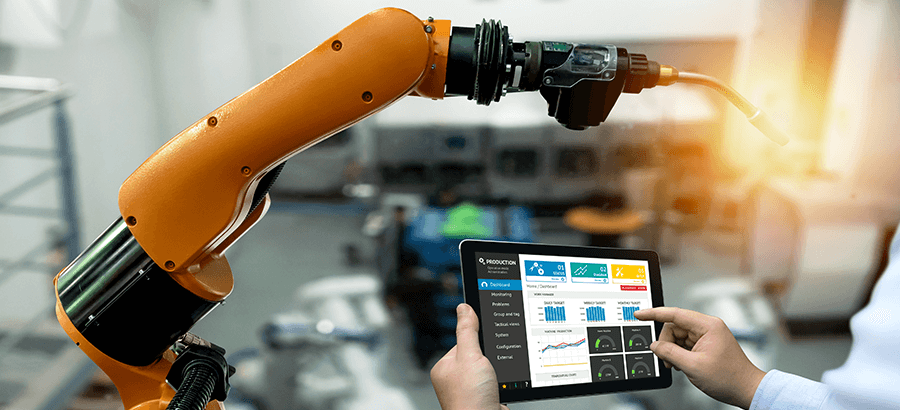We are currently experiencing a new industrial revolution. Like past revolutions, it too will have immense impact, causing ripples throughout society. Some jobs will be replaced by intelligent robots, and some people will have new electronic companions, so called cobots. Two thirds of the children in primary school will work in jobs that don’t yet exist. In the future, manufacturing processes, working life, and our relationship with technology will be quite different.
Transforming Industry with IDTs
There are a number of technologies having a major impact on industry today, or are expected to in the near future. The Internet of Things (IoT) has been around as a concept for a few years now, and has been proven in many companies. There is still much potential, though, especially for connecting legacy machinery.
Robotics has come in leaps and bounds in recent times, both figuratively and literally. We’ve all seen the videos online of robots that demonstrate uncannily human or animal-like behaviour. They can take on increasingly sophisticated tasks, with improved dexterity and analytical capabilities.
That links in to the third major technology transforming industry: artificial intelligence (AI). The advancement of AI continues at pace and is set to transform the way we do business.
When these technologies are combined, the sum is very much greater than the value of the parts. For example, connected devices can generate huge amounts of data, which artificial intelligence can be used to analyse. That can lead to new models for identifying defects on the production line, or identifying machinery at risk of fault. Robots can then be used to intervene automatically.
The term Industrial Digital Technologies (IDTs) has been coined to cover these technologies and others that are increasing productivity and effectiveness in manufacturing.
Making Industry Smarter
IDTs can prove transformational across all areas of industry. For instance, the UK government’s recent Made Smarter Review highlighted the following advantages:
Digital Technologies have the potential to add US$14.2 trillion to the world economy over the next 15 years, and the Internet of Things and Big Data between them make up the lion’s share of this figure.
So why are many manufacturers, in particular SMEs, still slow to adopt IDTs?
The Barriers to Adopting IDTs
The Made Smarter Review asked manufacturers what was holding them back from adopting IDTs and the answers fell into two broad categories.
The first of these involves technology issues which include cybersecurity concerns, slow Internet connection speeds and legacy equipment. However, in my view, manufacturers need to model the business case for investment because the savings made from adopting IDTs will often outweigh the costs incurred.
The other category comprises organisational issues, which mostly entail a lack of expertise. Manufacturers said they have a limited understanding of technologies and the opportunities they present. They are lacking trusted advice and they don’t have the skills to implement the technologies.
ERP Systems Enabling Adoption of IDTs
I was particularly struck by the figures around Enterprise Resource Planning (ERP) adoption cited in the review. European Commission data for 2015 shows that just 17% of UK enterprises use ERP systems to share data internally and enhance productivity. That’s half the EU average and the UK is falling behind competitors in Europe in this fundamental technology.
These issues however are not restricted to the UK and can be applied to manufacturers across the world.
Perhaps the lack of an ERP system is also an unspoken barrier to adopting AI, robotics and the Internet of Things. After all, if you don’t have processes in place to manage information and make decisions based on it, it’s hard to see the value in collecting it. If you haven’t optimised and automated your existing processes, you probably don’t have the time to invest in innovation either.
So, I would like to extend an offer to help: if you’re a manufacturer that doesn’t have the skill or knowledge to implement ERP, and it’s stopping you from innovating, get in touch with us. We’ve helped more than 15,000 companies in more than 60 countries over the last four decades and we would love to be part of your revolution.



